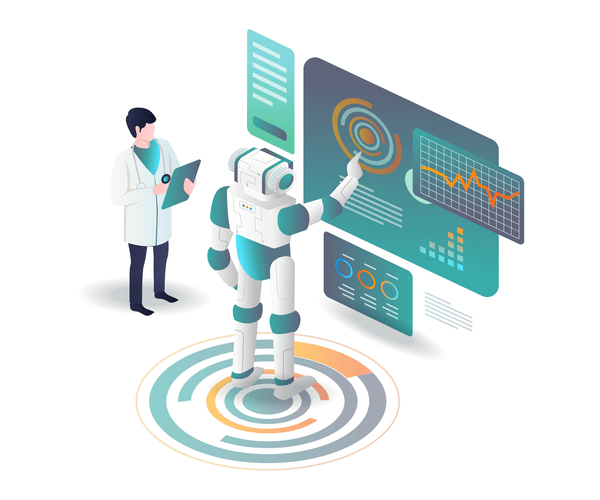Inclusion of AI in market research doesn’t only make sifting the crux from the pool of available, unstructured data extremely easy & convenient, but also speeds up the process while significantly reducing the cost associated. Sounds interesting? There’s more striking facts ahead, check out!
The Impact of Artificial Intelligence in Market Research
Your research has landed you at the right space,
But with AI doing it for you, you could have been here way sooner!
( No wonder why modern businesses are going gaga over AI development services today!)
Better late than never, let’s dive right in.
First things first, even with the staggering tech advancements in place, in today’s date the expectation shouldn’t be set around solely using AI in marketing, but to use AI in conjunction with a compact seasoned marketing team to reap optimum benefits.
However, AI and automation don't imply the same, even though it is mistaken more commonly than ever! Let’s understand the basic difference first. Automation is a set of pre-defined rules adapted primarily in order to take manual efforts off a set of processes and amplify the volume of outcomes while ramping up the speed. But, no matter how complex of a task is automated, a software only follows the fed instructions.
The difference between automation & AI lies exactly there – automation doesn’t enable self-learning and can’t help with decision making directly. In short, automation lacks cognitive abilities & that is AI’s biggest strength.
In essence, the direct impact of AI based market research can be broadly perceived as three pointers :
To make business decisions driven by logical data
Scanning a humongous amount of data across multiple sources to draw prudent AI insights
Performing the research under unbelievably lesser time while achieving higher than ever efficiency.
However, AI marketing is not a one-size-fits-all concept and that means, what works for another business from the same industry, may not bear the same results for you!
Explore the AI opportunities within your market research workflow,
What AI in Market Research Refers to?
Put simply, AI in market research refers to enhancing traditional methodologies used to gain consumer intelligence like interviews, discussions, surveys etc. by introducing ML algorithms to collect real-time data and extract patterns through its predictive capabilities. As a result, it generates updated AI insights of higher quality, capturing even the minute market changes transparently.
For example, a health & fitness product selling brand can implement a custom AI model in market research to scan across online conversations around recent healthcare & fitness trends & competitors’ offerings all over public domains. This way, they can factually brainstorm on product innovation ideas and digital marketing strategies in-line with the market demand – all under a lot less time, a lot more logically, launching products & services that the target customers need instead of flying blind with offerings that don't cater to the market in any valid way.
Example of AI in Market Research
AI is widely used in every industry at varied scales today and it’s no secret. AI based market research has picked up significant pace over the past 5 years and now, businesses across the globe can be divided into two groups – those who have started reaping the benefits of AI & those who’re planning to! While there’s every bit of detail for the latter squad ahead, here goes a few examples from the former, at a glance!
- The real estate industry is extensively using AI for market research to evaluate an enormous data pool to identify hot leads’ persona, type of properties gaining traction, most sought-after property facilities etc.
- Across ecommerce & supply chain businesses, there’s a visible spike in AI usage for market research to gain insights on product performance, changing consumer behavior & preferences along with the factors causing it, inventory management etc.
- Fintech businesses are heavily relying on AI based market research to come up with services & products that add up to contemporary convenience while ensuring secure handling of sensitive data
Top 9 Ways to Use AI in Market Research
At this point it’s evident that AI’s abilities & the concerns of market research space, is a befitting match. So now, the question is how exactly is it so?
Let’s dig right into the top 9 use cases of AI in market research!

(1) Omnichannel Open-Ended Text Analysis
No matter how smartly the businesses operate today, the customer still remains the king.That means, without the customers in place, there’s practically no value of a business and well, isn’t it enough of a reason why the target customers should be lent an ear to, even before they’re there?
Right, the obvious next thought is, manually attending which-customer-has-to-say-what is practically only as possible as dropping a jar of mustard seeds on the floor & handpicking each back in the jar. Surely not ‘impossible’, but tedious to the t!
AI, on the other hand, does it effortlessly when integrated to your market research workflow, here’s how : It takes each & every open-ended survey response from an array of communication channels – from the age-old emails to the trending social media comment boxes & more, and
deep dives into them to sift out the exact thoughts & feelings off those information.
While it may sound pretty black and white to analyze sentiment from the comments, it actually isn’t. Let’s look at an example! Suppose, you are performing a research on reviews of a particular hotel and two of the reviews go like this :
Review 1 : “In one word, wow! Everything about our stay was perfect, from the food to the clean linens to the courteous staff, loved it.”
Review 2 : “Breakfast wasn’t served on time, nobody bothered to clean the space, took 10+ attempts to reach out to room service on call..wow! could it be any better?”
Now, evidently, simply relying on keywords for sentiment analysis will not be a great idea in this case, as the ‘wow’ in first certainly doesn’t mean what the second ‘wow’ does! To ensure there’s no such cognitive hiccup in research, at BinaryFolks we build robust NLP and deep-learning driven sentiment analysis module to level up your market research game, as the model auto-runs to scan through free flowing texts in real time, to analyze the implicit sentiment instead of casually capturing literal meaning.

(2) Conversational Insight Collection
Suppose, you are collecting data to set-up the menu for a new cafe. Now, while running a survey with your target respondents i.e. youngsters who usually form the larger chunk of cafe crowd, you ask a question, “What are the top 5 items you usually order when you visit a cafe?”
Now, you get answers like, “Cappuccino, brownie, sandwiches, cake, croissants..”. Does that sound like enough information to jump straight into the menu drafting phase? Clearly, no.
But, if you further ask, “Any specific type of cappuccino?”, you’ll get answers like, “nutella cappuccino”,”java chip cappuccino”, “pumpkin spice cappuccino” etc. Or with a niche question like “Which type of cake?”, you’ll receive responses as “strawberry tea cake, lemon yogurt cake, fruit cake..” etc.
That’s the necessity of follow-up questions in market research – to clarify the information to add highest value to the research outcomes! However, it needs no clarification how difficult it can be to go about such a conversational follow-up survey trail manually, right?
That’s exactly where AI steps in to ease your struggle and does it, well, way better, with the highest possible efficiency & accuracy! AI-driven market research empowers businesses across industries to collect to-the-point, meaty information. Bespoke AI models closely monitor consumer interactions and thus, identify repeating patterns. Conversational chatbots can be trained with similar input to conduct an application set, for providing an advanced, more improved user experience. Guess what’s even better? These chatbots can actually self-learn from the conversations on-the-go! No more boring surveys for your respondents & better consumer market insights for you – good deal?

(3) Transform Operational Data Into Experience Data
Putting actionable insights into action is the second step, the first is still extracting the right insights! Let’s face it – there’s no dearth of data in today’s date, be it those present external to an organization i.e. across the globe, and that a business produces throughout its day-to-day functioning. But most of that internal operational data often goes unprocessed as they are stored somewhere & left untouched. But, while it’s a great idea to put your AI models to collect external insights, getting them to process your existing operational data is equally valuable.
Think of a second pandemic hitting the world in about a decade's time and you opt for AI market research that only considers the available data from that time. While you’ll surely get a grasp of the market scenario of that time, you’ll miss out on the crucial data points present in the historic data that holds information regarding the first pandemic’s impact on your business metrics & combat mechanisms adapted at that point including what worked then, what did not. This is where the power of historic data lies! A custom trained AI engine can help you unleash every bit of potential from your operational data and transform it to experience data for mining quality insights & strategizing the workflow modification in a better way.

(4) Auto Report Generation
What’s the easiest way to get to the ‘execution’ phase, after the plausible data is crunched into actionable insights?
By visualizing them into straightforward, visualized reports!
Artificial intelligence driven report generation modules empower businesses to generate crisp reports with customisable metrics. As a result, the different departments of an enterprise can mold the reports as per their need and feed the crucial decisions with what’s relevant, without any fuss!
For example, let’s suppose you are running a shipping business & you onboard AI in your market research wing to make more-informed decisions. Your operations team can generate reports showing relationships between empty miles, regional segmentation, package placement, freight scheduling etc. for safe & economic operation.
Your accounting team can look at reports showing expenditures & profits across a custom-set timeline to optimize future financial decisions.

(5) Bias Removal for Highest Data Integrity
Data integrity has been a constant concern for the market researchers since ages & bias has been the biggest reason. From a survey question being partial due to a biased questioner, or an answer being biased due to bias at the respondent’s end, chances of data skew remain high. AI has enough potential to combat bias to a great extent, as it generates high-quality data, mapping it against reasonable, standardized associated metrics. That way, data bias is minimized, ensuring that the research results in near accurate, close to unbiased data.

(6) Customer Success Automation
A customer's post purchase experience is just as important for your business’ wellbeing as new customer acquisition. While it can be a tedious task for a customer success team to stay on top of all the follow-ups and even the ‘stay-in-touch’ messages. But when AI takes over the same task, from ‘scheduling’ to ‘collecting insights on the message content & frequency performance’ to ‘better performing metric suggestion’, everything is done with far more precision & accuracy. While this takes the customer retention game up by notches, having a loyal customer base is undoubtedly a big plus.
AI in market research enables effortless community maintenance through predictive modeling, i.e. compiling an array of attributes associated with customer’s time spent over your business’ digital presence. With such streamlined churn prediction, it becomes easy for your customer success professionals to prevent the same with timely measures.

(7) Advanced Secondary Research
Effective research isn’t a one step process and who knows better than you, how the dedicated unique purpose differentiates one round from another!
As the name goes, secondary research is the layer of deep digging performed over the information collected through the first round of research. In essence secondary research is a great exercise for companies operating at any scale, as it helps with understanding emerging markets better, strategizing pricing in the most profitable yet competitive way, reviewing their suppliers and more of such crucial aspects. Now, what exactly differentiates primary research from secondary? The extent of refining the information.
Quick example, let’s assume you’re performing market research to chalk out a list of routes for a freight rental service company.
Through primary research, you’ll be collecting all the information regarding what your competitors are offering, their pros and cons, the USPs etc.
Now, a secondary research should ideally be aiming to leave you with a crisp list of routes along with the logic that’ll justify your service specs definition.
AI-based market research can take up your secondary research goals and finish it within much less time. With its striking capabilities ranging from factually analyzing the impact of trends to aligning the resultant with your specific goals, an AI based secondary research has become a contemporary Chief Data Officers’ choice for obvious reasons!

(8) Self-Evolving Surveys
What’s better than seamlessly getting surveys completed within deadlines?
Surveys that learn from the responses and self-trains to achieve more streamlined responses.
While it sounds like a dream, the late 21st century AI advancements have made it a reality & how! Drafting the right questions, the 0th step of market research, has always been a matter of concern – as the more mindful it is, the better responses are obtained. That’s the struggle AI has eased by not just shooting a pre-set questionnaire, but also closely analyzing the answers and altering the questions ahead accordingly, to get improved results reaching the core goal.
At BinaryFolks, we follow an advanced approach to build ML models that enable your business to evaluate the percentage match between past responses & standard responses of asked questions and tweak the next question based on the experience, increasing response quality on-the-go.

(9) On-Point ICP Filtration
Would you rather, reach out to 10,000 leads chosen matching ICP somewhat 60% on an average,
Or,
10,000 leads chosen matching ICP to exactly 100%? Clearly, quality wins over, making the second, the obvious choice! AI based market research digs deep into the customers’ previous purchase pattern & backtrack to evaluate the common factors among their socio-economic status along with the professional & personal details, deriving eligibility quotient. As a next step, it generates a detailed & logical ICP, showing whose response will do highest justice to your research. Further, AI recommends strategies to retrospect & modify the ICP based on its previous filtration accuracy & external factor evolution. This way, your human resource is effectively utilized on hot lead processing, instead of effort-draining, slow lead generation & workaround.

The Future of AI Driven Market Research
Change is the only constant and it’s probably more evident in today’s tech world than anywhere else. So the obvious concern even after all these discussions could be, the current buzz makes the right sense around AI for marketing, especially market research now – but what’s next?
The question here might not be if it’ll still be relevant, because considering what it’s doing now, it obviously will, even if there’s no added perks it provides. But evidently, with time, there will be newer forms and patterns of data generation, leave alone the volume amplification and thus, higher needs to get consumer insights filtered from them & cater to business’ wellbeing.
So at this point, let’s do a quick AI autopsy factually, and see what the future can possibly bring!

[a] Advanced Decision Intelligence for More Informed Business Choices
Market research primarily aims to back vital business decisions with practical data points compared to anticipate the future to the closest possible extent. That way, the next-course-of-action doesn’t come from the gut, but from data, with logical reasoning!

[b] Chatbots for Conversational Qualitative Response
If you analyze the AI-powered chatbots used in market research today, you’ll find that their capability is restricted to only answering questions which are pre-fed. But the AI practitioners anticipate that as AI advances ahead, conversational qualitative response might be a possibility. In simple words, the prediction is that chatbots may be able to auto-train themselves to answer different forms of questions encountered, through qualitative self learning.
Conclusion
Love the idea of using AI in market research?
Your business will love it even more!
Well, the bottomline is,
ML models can help you with the fundamentals of market research, in the most advanced way, majorly improving :
How you ask the respondents
To whom you ask
What you ask
Where you ask
P.S. – Just in case you were wondering what it takes to get started,
Talk to BinaryFolks AI Consultants




.png)